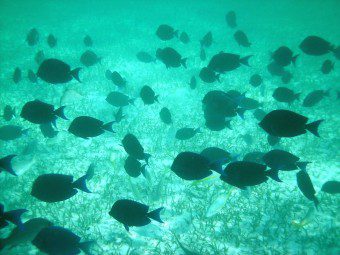Belize Fishing Regulations
Why you should Care . Fisheries Stocks are declining globally the ocean is not the unlimited resource we once thought it was. Many Scientists are predicting a complete collapse in the next 50 years. While Belize is better off than some countries, catches have declined in recent decades and most of the large (>40cm) fishes are gone.
The Belize Fisheries Department is doing their best by implementing seasons and size limits for many commercial species but data collection and enforcement are often difficult obstacles.
We need greater protection of out wild fisheries stocks and better ways to rebuild dwindling stocks not only for continued seafood production for future generations, but also to preserve the marine eco-system which in turn will help protect the planet.
You are what you eat . Pollution in our oceans has a real trickle down effect. Mercury has been found in many large fish and shark species and warnings exist especially for pregnant women on just how much fish they should eat. There are currently no regulations on shark fishing in Belize and it is often substituted for fish in local treats like panandes.
Lionfish are an invasive species to the Caribbean that eat up our commercial fishand have no natural predators here; the best eradication methods are to kill them and they are good to eat too. But take care as their fins are poisonous (not the fillet though) See lionfish Hunter website for catching and cooking advice.
You can make a difference. Supply and Demand. If the consumer knows the proper seasons for seafood in Belize they are better equipped to make decisions at the restaurant or on their fishing trip. BY ensuring your local guides and restaurants comply with Belize’s Fishery Laws you are helping to protect commercial seafood species for generations to come. While we are making strides in mariculture options they can never replace natural stocks which still need more protection now and forever.
Complete Ban – Coral – All Parrotfish – Blue Tang – Surgeon Fish – Permit – Tarpon – Bone Fish – Marine Turtle (all species) -Whale Shark – All Marine Mamals – Diced Conch – Diced Lobster
Closed Seasons – Conch July 1st to Sept 30th – Lobster February 15th to June 14th – Nassau Grouper – December 1st to March 31 Wild Shrimp (trawler sources; farm shrimp is legal all year around) July 14 – March 14th – Hickatee May 1st to May 31st
Catch & size limits – Conch Shell Length > 7 inches Market Clean > 2.5oz – Lobster Cape Length > 3 inches Tail Weight 2.75 oz – Nassau Grouper Must be 20 – 30 inches only. Must be landed whole (no fillet)
Special Laws and Permits – All fishermen must have a valid license. You must be a Belizean Citizen or permanent resident in order to obtain a fisheries permit. Sea Cucumber requires a special permit. Fish Fillet must have skin patch left on 2inch by 1 inch. No fishing while using artificial breathing devices (scuba gear or hookah)In Marine Protected areas several restrictions on fishing gear apply: no nets, no longlines, no traps. Belizelaw.org Chapter 2105
Links worth checking – Healthy Reefs for healthy people – Science to ActionMarket Clean turning marine science to policy – agriculture.gov.bz ministry of Agriculture and Fisheries – Monterey Bay Aquarium concervation of the oceans for more than 25 years – research.calacademy California Academy of Sciences.
Click here for a poster covering Belize Fishing Regulations
Get a fishing license here:
https://apps.coastalzonebelize.org
